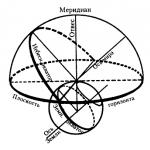Future simple is used to denote. Future Simple - simple future tense in English: uses, examples, formations
The Future Simple Tense is a simple future tense in English. It is a temporary form that is able to express a single, permanent, as well as periodically or constantly repeating action that refers to the future tense and is described in speech.
Education Future Simple
Affirmative sentence form
The formation of Future Simple is not a complex issue. An auxiliary verb will is required. It should be noted that the Future Simple formula is built quite simply and is easy to understand for someone who is just starting to learn a language: first, the subject will be in the sentence, then the verb will will be located, and in third place is the main verb, which will lack the particle to. Earlier auxiliary verbs were shall and will. Now the latter is the only variant of the auxiliary verb of this tense, and shall is only sometimes used to build some questions, which is discussed below.
Any form of an affirmative sentence in the future tense in English will be built like this:
I/He/She/It/We/You/They + will + the first form of the semantic verb.
Examples:
I will come to you. - I will come to you.
He will do this for you. He will do it for you.
The verb will in the affirmative form can be combined with the pronoun into a more convenient abbreviated form: I'll, He'll, They'll.
The form to be in Future Simple is not considered separately, since the verb to be does not change, as it happens in Present Simple or Present Continuous. The verb to be in the future tense has its original form.
Negative sentence form
Sentences in Future Simple can also be built in negation. To do this, it is enough to add the particle not to the auxiliary verb.
The formula in this case looks like this:
I/He/She/It/We/You/They + will not + the first form of the main verb.
Examples:
I will not come to you. - I won't come to you.
He will not do this for you. He won't do it for you.
For a normal negative sentence in the Future Simple Active, you can also use the easier to use form with will not: will + not = won't. This wording is used more often than the usual one.

Interrogative sentence form
Questions in Future Simple are also built quite simply. Any interrogative sentence begins with the verb will (with the exception of special questions discussed below), followed by the subject and the semantic verb in its first form. It looks like this: Will + I/he/she/it/we/you/they + the first form of the semantic verb.
Will I come to you? - I will come to you?
Will he do this for you? Will he do it for you?

Special questions
In addition to general questions, special questions are also used in the future tense. To build them, the words are required: who (who), what (what), when (when), which (what), whom (to whom), where (where). In this case, the formula looks like this: interrogative word + will + pronoun + first form of the semantic verb.
In the case of using the interrogative word who (who), there is no pronoun in the formula, since it is the answer to the question asked.
Who will go with you? - Who will go with you?
What will we see in Italy? What will we see in Italy?
Application of the future tense
The rules and examples of using the Future Simple are quite varied.
Time is used to make a guess about a certain action in the future. That is, a person thinks or guesses that some specific action will happen:
The book will give you lots of useful information. You will find a lot of useful information in this book.
In sentences, you can find verbs that directly indicate doubt, some kind of assumption, confidence, or uncertainty about something:
think, hope, believe, expect, imagine;
be sure, be certain, probably, perhaps.
You can pass a variety of values:
- A simple action and a fact in the future: You will go to the theater tomorrow. You will go to the theater tomorrow.
- Recurring action in the future: In Italy I will go for a walk every day. In Italy I will go for a walk every day.
- Consistent future actions: I will cook breakfast and we will eat with my sister. I will cook breakfast and we will eat with my sister.
- Promise: He will come and help you with all things before leaving. – He will come and help you with all your things before leaving
.
- Spontaneous decision: Look at this interesting book! I will buy it immediately! Look at this interesting book! I'll buy it right now!
- Offer or do something: Will they have a cup of tasty coffee? Will they have a cup of delicious coffee?
- Asking for something: Will he help her to find a book? Will he help her find the book?
- Threat or warning: Listen to me or I will be angry. “Listen to me or I'll get angry.
- An action that will take place over which we have no influence: She will be eleven next month. She will be 11 next month.
Using shall
Is the auxiliary verb shall relevant for use in Simple Future tense? This word has long been considered obsolete, because examples of sentences with it are practically absent in practice.
But you can still meet this auxiliary verb in official documentation and texts, or in outdated formulations. Also, sometimes with its help, sentences are formed in which we ask someone's opinion. Future Simple - examples using shall:
Shall I buy this T-shirt? Should I buy this T-shirt?
You can sometimes meet shall and in such a sense as "should". Using the Future Simple with shall:
She shall buy this T-shirt for me. She should buy this T-shirt for me.
A proposal for spending time together when the Shall we construction is an analogue of Let’s:
Shall we watch TV? - Shall we watch TV?
An offer to do something for someone:
Shall I help him? — Can I help him?
What will be the hint?
To determine the Future Indefinite Tense with accuracy, you need to pay attention to the markers, which are time indicators. By such simple clues, you can understand that you have a sentence and wording from Future Indefinite Active.
Examples of satellite words Future Simple:

Tomorrow - tomorrow
The day after tomorrow - the day after tomorrow
Next day, week - next day, week
In one day - in a day
Tonight - in the evening
Soon - soon.
Demonstrative words can be different, refer to a different period in the future. With the help of such markers, a detailed sentence for Future Indefinite Tense is formed.
The Future Simple and will are used to express one's thoughts about future actions or any states. If you want to start learning English, you will master this time quite quickly, so you can start learning now! If you have any questions or conclusions about your achievements, leave your comments.
Hello, hello, my good ones.
Today we will talk about a rather simple thing - about the time of Future Simple. Surely this time can be called one of your favorites. That's why it's simple. We are waiting for rules and examples, exercises and a test, as well as a lot of interesting and useful information.
How is formed
Future Simple is not at all picky in its education. But still, let's analyze in detail all the forms. The general rule looks like this:
Subject + will\shall + predicate + object and circumstance.
We shall visit you next summer. We will visit you next summer.
The negative form is formed with the particle not.
And to form an interrogative sentence, you will have to move will to the very beginning of the sentence.
Great, now we know the whole order of education. It's time to find out when we can use it.
When used: beginner level
In English, this is the easiest tense. Everything is pretty clear, but there are many cases of use. And it is desirable to remember all of them.
- When we talk about an ordinary action in the future that happened once.
I shall meet you at the main entrance. - I'll meet you at the main entrance.
- When the action will be repeated in the future.
We shall see each other every winter. - We will see each other every winter.
- When during a conversation we make a decision about the future.
Ok, I shall vote for your idea at the meeting. - Okay, I'll vote for your idea at the meeting.
When used: professional level
But still there are special use cases for Future Simple.
- When it comes to future facts.
The shop will open in August. - The store will open in August.
- When it comes to an offer.
I shall help you with this project presentation. - I will help you with the presentation of this project.
- Promises, requests and denials.
I promise you will get this job. - I promise you will get this job.
Will you bring the book you told me about? Will you bring me the book you were talking about?
Sorry, I shall not help you. I have to work with my department statement. - I'm sorry, I can't help you. I have to work on my department's report.
! It is very important to remember that usually after if (if) in 99% of cases will is not put. For example:
If you go, I will go with you. - If you go, I will go with you.
But let's look at another sentence:
Mother asks me if I shall go to the prom. Mom asks me if I will go to the ball.
You may have already noticed that if (and sometimes whether) is translated here as " whether', not 'if'. An indirect question does not require a change in word order and a question mark at the end. Therefore, all the words in this sentence are correct and very necessary.
Let's see some more examples:
Tom is wondering whether I shall help him with his homework. Tom is worried if I will help him with his homework.
If you help me with my project, we will go to the theatre. - If you help me with my project, we will go to the theatre.
Hope you feel the difference. Now let's see how else we can talk about the future.
More ways to talk about the future
- To be going to.
Sometimes, instead of the standard future tense, we decide to use to be going to. This happens when it comes to assumptions and intentions based on current events.
Look, Sarah is going to jump from the cliff to the sea. - Look, Sarah is going to jump off a cliff into the sea.
I am going to study at the University of Michigan. - I'm going to study at the University of Michigan.
- present continuous.
You can use the present instead of the future when you talk about plans and intentions.
I am seeing Laney tomorrow morning. - Tomorrow morning I meet in Laney.
She is asking for a pay rise tomorrow. Tomorrow she will ask for a pay rise.
Without practice, no future - and time, and not for you as well - does not shine. Therefore, I have ahead of me that will help you consolidate your new English grammar skill. There is also a small quiz that will test your knowledge in an interesting way.
In the meantime, I'm going to prepare new interesting materials for you.
See you soon, my dears.
P.S. And in order not to miss these newest materials - subscribe to the blog newsletter. I promise - there will be a lot of interesting and useful.
Let's look at how to build different types of interrogative sentences in the future simple tense in English. So, future simple. Questions in Future Simple.
Remember that in Russian there are 2 forms of the future tense: simple and complex. A simple one is formed by changing the verb: go - I'll go, eat - eat, pour - pour. Difficult - with the help of the word "I will" and the infinitive - I will walk, I will eat, I will pour. In English, only this is expressed by one form of the future tense - will + infinitive. I will pour \ pour \u003d will pour.
 Let's remember what types of questions exist in English:1. General question- Will you go to school? 2. Alternative question: Will you go to school or stay at home? 3.Special question: What time will you go to school? 4. Separating question or "question with a tail" You will go to school, won't you? Are you going to school?
Let's remember what types of questions exist in English:1. General question- Will you go to school? 2. Alternative question: Will you go to school or stay at home? 3.Special question: What time will you go to school? 4. Separating question or "question with a tail" You will go to school, won't you? Are you going to school?
I will take examples from English textbooks.
General question: Will + who + verb + rest +?(Do not forget to put a question mark at the end of the sentence. Otherwise, you always forget)
Will you play basketball tomorrow?- We start the translation with the subject. Are you going to play basketball tomorrow? (when translating, the words can be rearranged as it will sound better in Russian). If translated as in English, it would be: Will you play basketball tomorrow? - some nonsense. More examples:
Will they come to me next Sunday? — Will they come to me next Sunday?(remember that we do not use prepositions with the word next.)
 To make a general question out of a statement, you need to rearrange the word will to the first place in the sentence. — My father will get a nice present tomorrow. — Will my father get a nice present tomorrow? Will my dad get a wonderful present tomorrow? (while the “who” part is expressed by a pronoun + noun = my father) Will they find the orchid? Will they find an orchid?
To make a general question out of a statement, you need to rearrange the word will to the first place in the sentence. — My father will get a nice present tomorrow. — Will my father get a nice present tomorrow? Will my dad get a wonderful present tomorrow? (while the “who” part is expressed by a pronoun + noun = my father) Will they find the orchid? Will they find an orchid?
Alternative question. It is built using the union "or" - or. And there is always a choice "something or something". Will +who+ verb+ rest +or+ something else+? Will you go to school or stay at home? — Will you go to school or stay home? Will you read a fairy tale or an adventure story? — Will you read a fairy tale or adventure story? Will your mom cook soup or bake a cake? — Will your mother make soup or a cake?
The answer to such a question would be complete: I will stay home. Or in short: Adventure story. Cake
Special question:Interrogative word + will + who \ what + verb + rest +?
 Question words: What- what, what, where- where, where, When- when, How much\many- How many how long- how much (in time) Why - why / why
Question words: What- what, what, where- where, where, When- when, How much\many- How many how long- how much (in time) Why - why / why
- Where will the event take place? — Where will the event take place? 2. When will the pie be ready? — When will a cake be done? 3. How much will it cost? — How much will it cost? 4. Why are you going there? — Why will you go there?
The answer to the special question will be a complete affirmative sentence. Or short without subject and predicate. The cake will be ready in 15 minutes\ In 15 minutes. — A cake will be done in 15 minutes\ In 15 minutes.
In real life, the short form is more commonly used. Children at school are forced to write complete nonsense.
Alternative question.It is built using an affirmative sentence in the future tense + , + negative tail (won’t + pronoun?) or vice versa: a negative sentence in the future tense + , + positive tail (will + pronoun?)
English has long taken a leading position among all other languages spoken by the inhabitants of six continents. In most countries, it is studied in schools and universities as the first foreign language. If you're traveling and don't know the language of the country you're in, there's actually a 100% chance you'll be contacted in English. Knowledge of English by an employee of a reputable company is no longer perceived by employers as a bonus, but as a requirement. That is why it is so difficult to overestimate the value of this knowledge and it is so important to start learning English right now.
What are the times
The English language is famous for its intricacy in terms of grammatical tenses. Ask any schoolchild or student if learning English is easy for him, and be sure that he will call this fact the main difficulty ...
Unlike Russian, there are as many as 16 tenses in English grammar! The three main ones are present, future, past tense. They are translated as Present, Future and Past respectively. At the same time, the future tense in English also has such a form as Future-in-Past, which is similar to our “would be” construction. Depending on at what moment and under what circumstances certain actions occur, times are divided into 4 groups:
- Simple (simple).
- Continuous (long).
- Perfect (perfect).
- Perfect Continuous (perfect continuous).
A clearer picture of all times can be obtained from the following table.
| Simple | Continuous | Perfect | Perfect Continuous | |
| present | I do | I am doing | I have done | I have been doing |
| Past | I did | I was doing | I have done | I have been doing |
| Future | I will do | I will be doing | I will have done | I will have been done |
| future-in-paste | I would do | I would be doing | I would have done | I would have been doing |
At first glance, it is not easy to understand so many grammatical tenses. If everything is more or less clear with the past, present and future, then how can a Russian-speaking person learn to distinguish, for example, the forms Simple and Continuous? And what is Perfect Continuous? Let's try to clarify everything by referring to Future Tense or future tense.
Future Simple (Indefinite)
As you already understood, the future tense in English can be simple, continuous, perfect and perfect continuous. The first of them is the Future Simple. Affirmative sentences with it are built according to the following scheme:
auxiliary verb will + verb I of conjugation.
In negative sentences, the particle not is added to will; word position remains unchanged. But if you need to ask a question, then the phrase should look like this:
auxiliary verb will + noun or pronoun + verb I conjugation?

Future Simple is used:
- if the speaker intends to perform some action in a certain period of time (I "ll read this book tomorrow);
- if the planned action is repeated systematically (If you move to Italy I "ll call you everyday);
- when a series of sequential actions in the future is presented (Firstly I "ll eat, then I" ll rest a bit and then I "ll do my homework);
- if the decision on the upcoming action is made at the time of the conversation (If you want you can go out with us tonight - Great! I "ll go).
As a rule, the simple future tense is accompanied by such temporary adverbs as tomorrow, next weekend, everday, soon, in some days etc.).
Future Continuous
Forming the future for a long time is a little more difficult than the previous one. In addition, it is important to understand in what situations it is used. The phrase structure looks like this:
noun or pronoun + will + be + verb I conjugation + ending -ing.

In the case of negation, the particle not is placed between will and be. The interrogative form practically does not change:
will + noun or pronoun + be + verb I conjugation + ending -ing?
The future tense in English, expressed by the Future Continuous, is used:
- if you need to show that the action will take place in a certain period of time (I "ll be still sleeping when you come);
- if the action is a kind of "prediction" (Don "t wait for me, I" ll be coming back late).
- when there is a clear indication of the time, i.e. the action is planned (Tomorrow I "ll be leaving at 6 a.m.).
Future Perfect
If you have already come across the Perfect form while studying other tenses in English, then you know that it indicates the completion of an action. In what cases can an action in the future be considered completed? First of all, if it is expected that by a certain moment it will be done (I "ll have done my homework by the evening). Temporal designations (by 5 p.m.), adverbs (then, before), as well as context help to understand this fact.
Affirmative sentences with Future Perfect are built as follows:
noun or pronoun + will + have + verb of III conjugation.
The particle not, when negated, separates the verbs will and have. The question form looks like this:
will + noun or pronoun + have + verb of III conjugation?
Sometimes in journalism or letters you can find sentences like "You'll have heard that my uncle is very ill". This construction has nothing to do with the future tense, but serves to indicate the assumption: "You must have heard that my uncle very sick."
Future Perfect Continuous
Now this future tense is rarely used in English. Agree, it is difficult to imagine a situation with a long-term action in the future, which is also completed. But nevertheless, it is worth talking about him.
Future Perfect Continuous is formed according to a scheme that combines the features of both long and perfect future tense:
noun or pronoun + +
As always in negation, not follows the auxiliary verb will, which is transferred to the beginning of the sentence when asked.

The future perfect continuous indicates an action that starts before another action that hasn't happened yet, but when it finally happens, the first action will already be completed... Confused? Let's try to figure it out with an example: "I"ll have been working here for 50 years by next year". That is, someone started working "here" 49 years ago and continues to this day, and next year this event will turn 50 years old. It turns out that that the action will be completed (after all, he will already cross the barrier of 50 years), but at the same time, the speaker indicates a certain period, which, in turn, shows that all this time the action (have been working) was carried out in the process. such complex tenses are conveyed by the prepositions by or for.
future-in-paste
The last form of the future tense, which we translate into Russian using the "would be" construction, is called "future in the past" in English. There are many situations when it could be used, and most often such sentences and phrases are accompanied by the verbs "thought", "said", etc. For example, "I thought he would come back yesterday". In this case, the time is simple and is built according to the Future Simple type. Only the auxiliary verb will becomes would, denoting the past tense:
noun or pronoun + would + verb of I conjugation.
Now let's take an example of Future-in-Past Continuous: "What is it? You said you would be working hard all the week but you are playing!". It is clear that here the sentence scheme is similar to the Future Continuous:
noun or pronoun + would + be + verb I conjugation + ending -ing.

As for the Future-in-Past Perfect, everything is more complicated here: "I thought that I would have made the cake before the dinner". The action had to be completed at a certain moment. As the table of English tenses is shown, such a sentence is constructed as follows:
noun or pronoun + would + have + verb of III conjugation.
And finally, everyone's favorite form of Future-in-Past Perfect Continuous, which you are unlikely to ever meet. Even book authors don't bother using it. Recall the example from the previous paragraph and try to turn it into "the future is in the past": "He said he would have been working here for 50 years by next year". It follows from this that the algorithm for constructing an affirmative phrase is as follows:
noun or pronoun + would + have + been + verb I conjugation with -ing.
Design to be going to
The future tense in English can also be expressed by the construction to be going to do smth., which can be translated into Russian as "to be going to do something." It is used in situations where the action is planned and will happen in the near future (I "m going to cook turkey oday?). The example shows that the sentence is built like this:
noun or pronoun + the corresponding declension of the verb be + going + the infinitive of the verb.

It is very important to remember that to be going to is not used if the infinitive is words like "go" or "come". In these cases, you need to build a phrase using Present Continuous (present long time). That is, instead of "I" m going to go to New York "it would be more correct to say" I "m going to New York".
Conclusion
In general, understanding English grammatical tenses is not as difficult as it seems. Moreover, some of them are practically not used in real life. The future tense in English, which was discussed in detail in this article, although it has many forms, is in fact not much different from the future tense in Russian. The only thing that a student of English grammar has to learn is to feel the slight nuances of actions and the moment when they occur or will occur. Gradually mastering the language, you will realize that it is not difficult at all.





